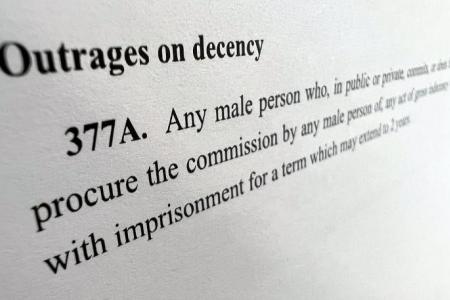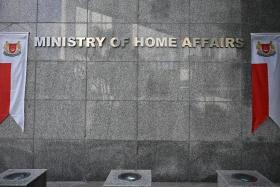NDR 2022: Five things to know as Singapore moves to repeal Section 377A
Prime Minister Lee Hsien Loong said during the National Day Rally on Sunday (Aug 21) that Singapore will do away with Section 377A of the Penal Code that criminalises sex between men.
Along with the widely anticipated repeal of the colonial-era law introduced by the British in 1938, the Government will also amend the Constitution to uphold and safeguard the definition of marriage between a man and a woman.
Here are some of the highlights around the announcement.
1. Why repeal the law now?
PM Lee said attitudes have shifted and gay people are now better accepted in Singapore, especially among younger Singaporeans.
Most Singaporeans now accept that a person's sexual orientation and behaviour are a private matter, and even many of those who want to retain 377A do not want to see it being actively enforced and criminal penalties applied.
At the same time, Section 377A, which has been the subject of multiple constitutional challenges in the past decade could also be struck off in a future challenge.
After the most recent case, which was thrown out by the Court of Appeal in February, Minister for Home Affairs and Law K. Shanmugam and the Attorney-General Lucien Wong advised that there is a significant risk the law could be struck down in a future challenge on the grounds that it breaches Article 12 of the Constitution, said PM Lee.
He added: "We have to take that advice seriously. It would be unwise to ignore the risk, and do nothing."
In its judgment in February, the apex court considered various scenarios under which 377A could fall foul of the Article, which states that "all persons are equal before the law and entitled to the equal protection of the law".
2. Safeguarding marriage and other policies
Along with the repeal, the definition of marriage will be protected from legal challenges in future, through amending the Constitution, PM Lee said.
The Interpretation Act defines marriage as "a voluntary union of one man and one woman to the exclusion of all others during the continuance of the marriage", while according to the Women's Charter, "a marriage solemnised in Singapore or elsewhere between persons who, at the date of the marriage, are not respectively male and female, is void."
PM Lee said the Government has no plans to change the existing definition of marriage or any of the policies that rely upon it, such as those on public housing, education, adoption rules, advertising standards and film classification.
Protecting this will help Singapore repeal Section 377A in a controlled, carefully considered way by decriminalising sexual relations between consenting men in private but retaining the basic family structure of marriage between a man and a woman, he added.
3. Why is there a need to protect marriage?
As the law stands, marriage, as it is now defined, can be challenged on constitutional grounds in the courts, just like Section 377A has been challenged, PM Lee said.
He added that it would not be ideal for same-sex marriage to become recognised here this way, noting that the court is not the forum for political issues to be decided.
If this happens, Parliament may not be able to change the law even if the majority of MPs oppose the changes, since changing the Constitution would require a two-thirds majority, he said.
Judges are trained and appointed to interpret and apply the law, and have neither the expertise nor the mandate to rule on social norms and values, and this has been wisely acknowledged by the courts in their judgments dealing with such cases, he added.
4. Repeal was many years in the making
In October 2007, as the House debated amendments to the Penal Code, then Nominated MP Siew Kum Hong filed a citizen's petition to repeal Section 377A. The move sparked a passionate debate on the topic, with fierce arguments from both sides.
PM Lee said that at the time, he acknowledged that what consenting adults do in private is their personal affair, but that not everyone was equally accepting of homosexuality, particularly within certain religious groups, including the Muslims, Catholics and many Protestant denominations.
The Government decided to leave Section 377A on the books, but not enforce it as it would have been too divisive to force the issue then.
He noted that the compromise did not satisfy every group. "But by and large, it has enabled all of us to get along, and so we have lived with this sensitive issue, without it monopolising our national agenda or dividing our society," he added.
He said one of the delicate tasks of the Government is to update laws and practices from time to time to reflect evolving social values and norms, and that its cautious approach on such matters has gone down well with Singaporeans.
5. What are the next steps?
PM Lee said he anticipates further reactions and discussions arising from his announcement. He added that there will be a full debate on the matter when the legislation is brought to Parliament for amendment, but did not say when this would happen.
"I hope the new balance will enable Singapore to remain a tolerant and inclusive society for many years to come," he said.
Get The New Paper on your phone with the free TNP app. Download from the Apple App Store or Google Play Store now


